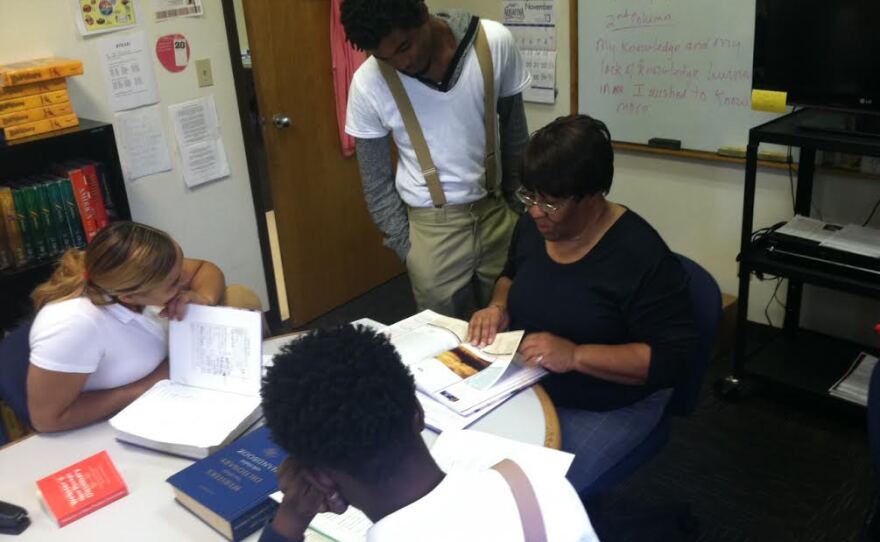When high school students in district 186 are expelled they're left with few options to obtain a diploma or GED. Over a decade ago, the Springfield NAACP started an initiative to address the number of black students being expelled. Since the year 2000, expelled high schoolers have been provided an alternative through those efforts - thanks in large part to retired teachers.
Adrianna Sivels is sitting in a conference room at the Calvary Missionary Baptist Church on the east side of Springfield. The building resembles a miniature version of a high school. When you walk in a receptionist greets you and has you sign in. Down the hall are classrooms for the 14 students attending this year. Sivels is going over the chapters in a book called 'Applying Life Skills' with Elbert Betts. He's been with this program since its inception.
Students end up here if they have been expelled from their schools for violent or drug-related infractions. Others, like Sivels, have had a hard time academically: "I went to South East, and after my dad passed it started going down .... I was getting bad grades. Then I transferred to Springfield (High School) in the middle of my junior year and my mom was sick and she was bedridden and I was there to take care of her- she didn't have anybody else and she didn't want to be in a nursing home," explains Sivels.
Sivels is 21 years old and has decided to get her diploma to make life less stressful, she says. She wants to go to Lincoln Land Community College and become a nurse. Betts is the kind of educator whose passion for helping kids can not be stifled by retirement, or a miniscule paycheck. He's been with the district since 1969 and served as everything from PE teacher to principal. Betts says the entire program here runs on less than $100,000 a year from district 186. Betts, 5 teachers and a program coordinator keep the classes going. The Springfield Urban League chips in for 2 of the teachers. As Betts explains, students who come here do so by choice. "The kids that we have in our program, they know what we want, they know what we expect. I'm just upfront with everybody - I have very high expectations of everybody. And I expect the best of every kid, I won't accept anything less than that," says Betts.
Lovora Hawkins teaches child development and English. She's been here nearly a decade after retiring from 37 years teaching elementary: "The students are very challenging, but cooperative, and very rewarding. And so we just keep pressing on and trying to help them." Andre Williams is the program coordinator. He says keeping these students in line requires a strict attitude and enforced discipline: "With this environment, it's smaller - I'm hands on with my teachers right then and there, I'm hands on with my students ... so it's kind of like we wear all hats. We're the security, we're the administrations, we're the support for the teachers, and at the same time we're mentoring and advocating for the students as well."
Williams explains some students who get expelled from district 186 are placed into GED courses like those at the Lawrence Education Center. But there are more extreme cases where students' only option is enrolling in the NAACP's Alternative Education Program. Those who come in before they are seniors may be placed back in one of Springfield's three high schools the following school year. Last year all 9 seniors enrolled graduated.
Williams says he would like to see it expand and relocate to a larger facility. He's slowly taking over Betts's roll as the leader of the program, though Betts says he will always advocate for the students of district 186. "I'm very thankful that God allows me to wake up every morning and can come and be here to assist these kids ... As I reflect and look back on what would have happened to ... these kids if I hadn't have been around," says Betts.
Betts says the number of students each year fluctuates and estimates the average has been 25 to 30. For now, the program will continue to serve as a second chance for students like Adrianna Sivels who may have made some mistakes or faced obstacles in the way of their studies - but are willing to put in the work required to graduate from high school.






